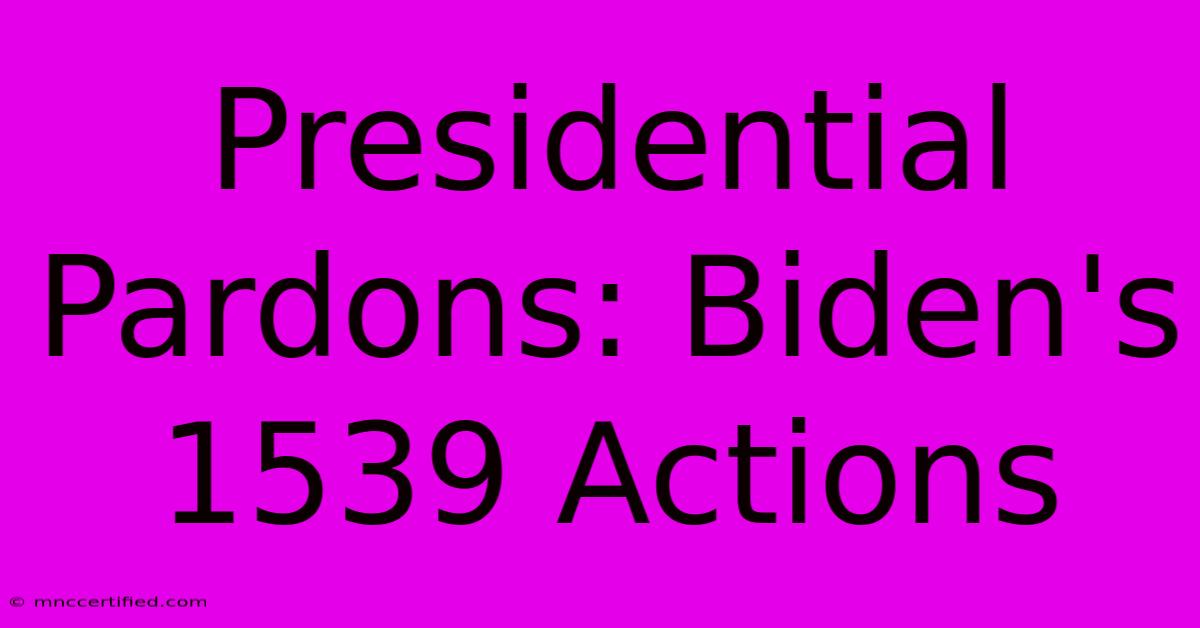Presidential Pardons: Biden's 1539 Actions

Table of Contents
Presidential Pardons: A Deep Dive into Biden's 1539 Actions
President Biden's use of the presidential pardon power has sparked significant discussion and analysis. With a total of 1539 actions (a combination of pardons and commutations) during his term, understanding the scope and impact of these decisions is crucial. This article delves into the details of Biden's pardon practices, examining their implications and comparing them to previous administrations.
Understanding Presidential Pardons and Commutations
Before analyzing President Biden's actions, it's essential to understand the difference between a pardon and a commutation:
-
Pardon: A pardon completely wipes away a criminal conviction, restoring all rights and privileges lost as a result of the conviction. This includes the right to vote, own firearms, and hold public office.
-
Commutation: A commutation reduces a sentence, but doesn't erase the conviction itself. The individual remains a convicted felon, although their time in prison is shortened.
Biden's 1539 actions encompass both pardons and commutations, focusing on specific areas of criminal justice reform.
The Scope of Biden's 1539 Pardons and Commutations
President Biden's approach to pardons and commutations differs significantly from some of his predecessors. His focus has been on:
-
Addressing Drug-Related Offenses: A substantial portion of Biden's clemency actions relate to individuals convicted of non-violent drug offenses, reflecting a broader national shift in drug policy and a focus on rehabilitation over incarceration for certain crimes. This aligns with broader criminal justice reform efforts.
-
Equity and Fairness: Many of the recipients of Biden's clemency were from marginalized communities, reflecting an attempt to address systemic inequalities within the justice system. This addresses concerns about disproportionate sentencing and conviction rates for certain demographics.
-
First-Time, Non-Violent Offenders: Biden's actions have prioritized individuals convicted of non-violent crimes for the first time, emphasizing second chances and rehabilitation.
-
Transparency and Process: While the exact details of each case are not always publicly available, the administration has strived for a more transparent process compared to some previous administrations, although critics argue more transparency is needed.
Comparing Biden's Actions to Previous Administrations
Comparing Biden's 1539 actions to previous presidents reveals significant variations in both the number and the focus of clemency grants. Some presidents, like Trump, granted a high number of pardons, often to high-profile individuals. Others, like Obama, also focused on criminal justice reform, but with a different emphasis and scale. A detailed comparative analysis requires examining the specific circumstances surrounding each president's actions and the prevailing political and social climate.
Criticism and Controversy Surrounding Biden's Clemency
While many applaud Biden's focus on criminal justice reform, his actions have also faced criticism:
-
Concerns about Overreach: Some argue that the sheer number of clemency grants suggests a potential overreach of executive power.
-
Lack of Transparency: Despite efforts at increased transparency, critics argue that the selection process lacks sufficient clarity and public accountability.
-
Political Considerations: Some critics allege that political considerations might influence the selection process, despite the administration's denials.
The Future of Presidential Pardons Under Biden
As Biden's term progresses, his continued use of the pardon power will be a subject of ongoing scrutiny and analysis. Further examination of the long-term impact of his 1539 actions on recidivism rates, rehabilitation efforts, and public perception of the justice system will be crucial. Analyzing data on those pardoned and commuted, tracking their post-release activities and comparing their outcomes with similar individuals who didn't receive clemency, will provide valuable insight.
Conclusion: A Complex Legacy
President Biden's 1539 clemency actions represent a significant intervention in the US criminal justice system. Whether ultimately deemed successful will depend on future analysis of the outcomes for those granted clemency and the broader impact on criminal justice reform. The legacy of these actions will undoubtedly be a subject of ongoing debate and scholarly research for years to come. Understanding the nuances of these decisions requires a critical examination of their scope, context, and long-term consequences.

Thank you for visiting our website wich cover about Presidential Pardons: Biden's 1539 Actions. We hope the information provided has been useful to you. Feel free to contact us if you have any questions or need further assistance. See you next time and dont miss to bookmark.
Featured Posts
-
Kupps Week 15 Fantasy Football Impact
Dec 13, 2024
-
Our Ladys Shrine Cold Cant Stop Faith
Dec 13, 2024
-
Chelsea Wins Astana 3 1 Conference League
Dec 13, 2024
-
Metas 1 M Donation To Trump Inaugural
Dec 13, 2024
-
New Elden Ring Expansion Nightreign Announced
Dec 13, 2024